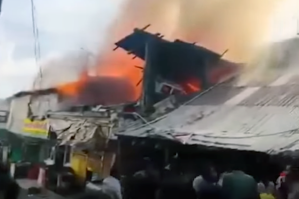
As ethnic unrest intensifies in Bangladesh, Christian leaders say fear and uncertainty are spreading among the country’s religious minorities, who feel increasingly vulnerable amid growing political instability and a breakdown of trust in state protection.
“Our Christian youth are perplexed; there seems to be no future for them in this country,” Martha Das, general secretary of the National Christian Fellowship of Bangladesh told Christian Daily International.
Her words echo the despair felt by many after the recent violence in the southeastern district of Khagrachhari, where three members of the Marma tribe were killed and dozens injured following protests over the gang rape of a 12-year-old indigenous girl.
The attacks have drawn scrutiny from the United Nations Human Rights Council (UNHRC) and triggered a diplomatic clash between Bangladesh and India, with Dhaka accusing New Delhi of interference and India dismissing the claims as “false and baseless.” The unrest has laid bare the deepening insecurity of ethnic and religious minorities, including Christian, Buddhist and Hindu, in one of South Asia’s most densely populated nations.
Rape of 12-year-old Marma girl sparks nationwide outrage and indigenous protests
The violence in Khagrachhari began after protests erupted over the alleged gang rape of a 12-year-old schoolgirl from the Marma tribe on Sept. 23, as she was returning home from private tutoring. Her parents found her unconscious in a field around 11 p.m. that night. Police, with army assistance, arrested one suspect, Shayon Shil, on Sept. 24, but demonstrations continued as protesters demanded the arrest of two other suspects believed to be involved.
The Jumma Chhatra Janata (JCJ), an indigenous student organization, soon mobilized road blockades and rallies across the three hill districts to press eight demands, including the arrest and prosecution of all suspects. The JCJ advocates for the rights of the Jumma people—a collective term for 11 distinct indigenous ethnic groups inhabiting the Chittagong Hill Tracts of southeastern Bangladesh.
Violence escalated sharply on Sept. 27 and 28 as protests spread across Khagrachhari district. According to a press statement issued by the JCJ on Sept. 29, armed settlers and military forces attacked demonstrators in Guimara upazila (subdistrict) on Sept. 28, resulting in what the group described as the “Guimara massacre.”
The statement identified three people killed in the violence and Police later confirmed the victims as Teiching Marma, 20, Aukhrau Marma, 22, and Athuipru Marma, 21 — all residents of Hafchhari union in Guimara upazila.
The student organization also reported that 16 people were injured in the clashes, including a 13-year-old child and a 70-year-old woman. It also documented the destruction of motorcycles and a car, along with several houses and shops belonging to indigenous residents.
According to the Bangladesh Army’s Inter-Services Public Relations (ISPR) directorate, armed members of the United People’s Democratic Front (UPDF) — a political organization representing indigenous peoples in the Chittagong Hill Tracts that advocates for full autonomy — positioned themselves on high ground west of Ramsu Bazar and opened fire with automatic weapons around 11:30 a.m. on Sept. 28. UPDF has an armed wing and faces ongoing military operations by Bangladeshi security forces.
The army said the attackers discharged between 100 and 150 rounds aimed at both hill and Bengali residents, as well as at army personnel attempting to restore order.
The ISPR statement said 10 soldiers, including three officers, were injured when they intervened to control the clashes between UPDF activists and local Bengalis. A Border Guard Bangladesh (BGB) vehicle was vandalized in Ramgarh, and several BGB personnel were injured. The BGB is a paramilitary force responsible for maintaining border security.
Local reports indicated that nearly 50 homes and 40 shops were torched during the unrest.
Pada Chakma told Christian Daily International that five Christians on their way to church were assaulted by the army. “They had to be hospitalized for their injuries,” he said. “All Christians were released from the hospital and are back home.”
Authorities impose emergency restrictions as Jumma students call for justice
In the aftermath of the violence, district authorities imposed Section 144 of the Criminal Procedure Code in Khagrachhari and Guimara — a legal provision that bans public assemblies and rallies. Despite the restrictions, a road blockade enforced by Jumma students and local residents disrupted daily life across the hill districts for several days.
On Sept. 29, a six-member delegation from the JCJ met with Khagrachhari civil administration officials, including the district council chairman, the district administrator, and the police superintendent. According to a JCJ press statement, the officials verbally agreed to all eight of the group’s demands except the withdrawal of Section 144 and assured that military harassment and arbitrary arrests would stop.
The student organization declared that “Jumma students are not a political party, not a separatist group either. Our spontaneous movement cannot be suppressed with the ‘UPDF’ or any other tag.”
The JCJ demanded compensation of 2 million takas (about $16,410) for the families of those killed, 1 million takas (about $8,204) for the seriously injured, and 200,000 takas (about $1,640) for those with minor injuries. The group also called for an independent judicial investigation within 10 days and the immediate release of all detained protesters.
Failure to protect minorities: rights groups condemn state inaction and call for inquiry
Following the unrest, police filed multiple cases related to the violence. Two cases were registered at Guimara police station on Oct. 1 and another at Khagrachhari police station, collectively accusing more than 1,100 unidentified individuals of crimes including murder, arson, and obstructing government duties.
The Christian Conference of Asia condemned the deadly clashes and urged the Bangladeshi government to guarantee the safety and protection of ethnic and religious minorities. The organization noted that homes, businesses, and places of worship belonging to indigenous minority communities were targeted during the attacks.
Transparency International Bangladesh (TIB) also issued a statement expressing strong outrage over the events in Khagrachhari, saying vested interests had turned a peaceful protest seeking justice for the rape of a 12-year-old girl into widespread violence. The group questioned why the army-controlled administration failed to prevent the attacks and called for a comprehensive judicial investigation, the exemplary punishment of the perpetrators, and accountability for those who instigated the unrest.
The situation in the hill districts remains tense, with prohibitory orders still in effect and security forces maintaining heavy patrols across the region.
Testimonies at UNHRC highlight concern about overall situation in Bangladesh
At the 60th session of the U.N. Human Rights Council in Geneva, held from Sept. 8 to Oct. 8, 2025, multiple speakers raised concerns over escalating attacks on ethnic and religious minorities in Bangladesh.
Suhas Chakma, director of the New Delhi–based Rights and Risks Analysis Group, told the Council that it was the Bangladesh Army that indiscriminately opened fire on protesters demanding justice for the Sept. 23 rape case, killing three indigenous people and injuring dozens more.
Charlotte Zehrer, a U.N.–EU Human Rights Officer with Global Human Rights Defence, reported more than 2,400 incidents of violence against minorities in the past year, noting that indigenous peoples in the Chittagong Hill Tracts — along with Hindu and Christian communities across the country — have been among the primary targets.
Nila Pada Chakma, coordinator of the Bangladesh Bible Society, told Christian Daily International that the attackers showed no regard for religion or ethnicity. “Their targets were the indigenous people. It did not matter whether they were Buddhist, Hindu or Christian,” he said. “Whose house was being burnt and who was being attacked did not matter to them.”
At the same session, rights advocates also cited broader data showing that Bangladesh witnessed 637 mob lynching deaths, the targeting of 878 journalists, 2,485 acts of violence against religious minorities, and criminal cases filed against more than 500,000 political opponents in the last year.
Dhaka blames ‘foreign meddling’; New Delhi rejects charges as “false and baseless”
Bangladesh Home Affairs Adviser Jahangir Alam Chowdhury told journalists in Dhaka on Sept. 29 that the instability in Khagrachhari was being fueled by “certain quarters,” allegedly with support from India or “fascist groups.” He claimed that miscreants had been firing from hilltops and suggested that weapons used in the violence often came from outside the country.
Chowdhury further alleged that a vested group was attempting to disrupt Durga Puja — a major Hindu festival — in the hill region, even as security forces were deployed to maintain order.
India on Oct. 3 categorically rejected allegations by Bangladesh’s interim government that it had a role in the recent violence in the Chittagong Hill Tracts. During a weekly media briefing, Indian Ministry of External Affairs spokesperson Randhir Jaiswal dismissed the accusations by Chowdhury as “false and baseless.”
“The interim government of Bangladesh is unable to maintain law and order in Bangladesh, and has a habit of routinely trying to shift the blame elsewhere,” Jaiswal said. “It would do well to introspect and conduct serious investigations into the actions of local extremists committing violence, arson and land grabs against the minority communities in the Chittagong Hill Tracts.”
“No future for them in this country”
For many Christians in Bangladesh, the violence in Khagrachhari has reinforced a sense of fear and abandonment shared across the country’s minority communities. Church leaders say the attacks, coupled with years of unaddressed discrimination and political volatility, have deepened feelings of isolation and uncertainty about the future.
“We are very hopeless with the present situation of the country,” Martha Das from the National Christian Fellowship of Bangladesh (NCFB) said. “Our Christian youth are perplexed; there seems to be no future for them in this country. Everything is uncertain and we will have to wait and see what happens in the February 2026 elections.”






